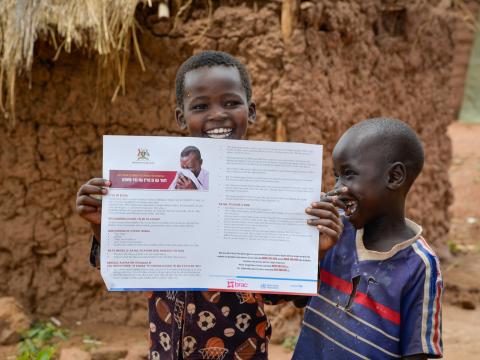COVID-19: Children face the highest risk

By Lucy Evelyn Atim
It has almost been five months since the world woke up to a deadly virus that would later turn economies and lives upside down. Almost every aspect of life has been affected, but a few considered important ones have been brought forward; The economy, politics, travel, entertainment, football. Workers, employers, the elderly and so on. There is little said about the children - a significant portion of the world population and the future’s only witnesses to what is happening today.
There are over 2 billion children in the world and the majority of these live in developing countries, where living conditions and the state of health care systems makes it hard for them to survive the secondary effects of this pandemic.
Current child deaths are low because severe novel coronavirus infections are rare among children, but resulting impacts will threaten many more children’s lives than COVID-19 itself. These include other diseases that will definitely rise due to lack of immunization, malnutrition, and malaria. According to the Aftershocks Report by World Vision, over 26 million children are likely to miss out on immunization due to reduced supply of vaccines and limited movements. Five million could suffer from malnutrition which is about a 40% increase from the current data, and malaria deaths could also increase by 50% among children.
COVID-19 has quickly changed the context in which children live. Quarantine measures such as closure of schools and Child Friendly Spaces, restriction on public gatherings and maintaining social distancing and restrictions on movements disrupt children's routine and social support while also placing new stressors on parents. This increases the risk of child abuse and exploitation because all children are at home and so are the people who pose a danger to them (the adults). The risk of having both adults and children locked at home for months is so great.
A recent Children’s voices in times of COVID-19 survey indicate that 91% of the children and young people face emotional distress and troubling feelings, including anxiety, anger, and worry due to the uncertainty of how long this crisis will last and dealing with isolation. A big number of these children are disadvantaged, cannot access technology and the internet. They cannot play video games to kill the boredom, they cannot read online or on TV, they are not able to chat with their friends, and it is this level of isolation that is mostly stressing for them even more than the virus does.
The situation is even worse for children in fragile contexts like refugee settlements. There are about 30 million children that have been forced to flee their homes because of conflict, violence and persecution and are now already living in precarious and insecure conditions in low-income and fragile countries. A big number of the world’s vulnerable children in refugee settlements are separated and unaccompanied and this means they live with elderly caregivers who are at a high risk of mortality from the virus.
Children in refugee settlements look at school as a source of joy, hope, and a good meal. With schools and Child Friendly Spaces closed now, refugee children have nowhere to go to enjoy play, interact with their peers or even access a psychosocial worker to guide them through their stress. Most of their parents live hand to mouth and amidst the current restrictions are incapable of providing a nutritious meal for their families.
I watched an inspiring video of William, a 14-year-old World Vision Child Ambassador in Omugo refugee settlement. He is stepping up as a community mobiliser targeting his fellow children with COVI-19 prevention messages. There is however, a trace of sadness in William’s voice when he speaks about how much he misses playing football with his friends.
“I cannot go to school because of Corona. I hear that Corona can kill people, and that is why I cannot even play football with my friends,” William says.
Children are powerful agents of change and despite the challenging feelings of anxiety and stress they still feel a strong need to contribute to the fight against the spread of COVID-19. We should give them a chance by getting them involved in this fight, and care to know what this means to them as a generation. When children and young people are involved and can participate in societal change, it increases their self-confidence, reduces the sense of a lack of control and they are better able to cope with difficult situations.